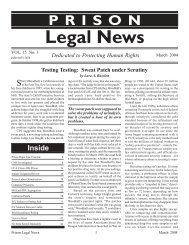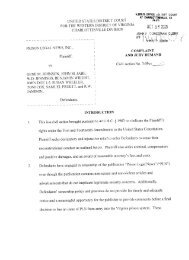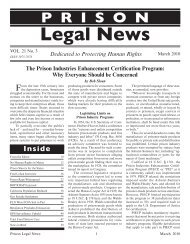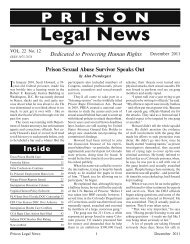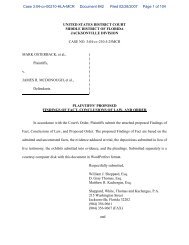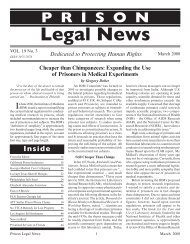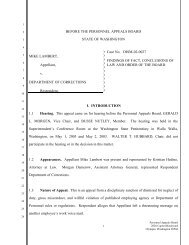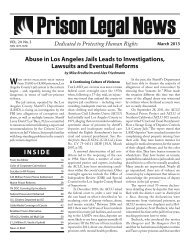From the Editor - Prison Legal News
From the Editor - Prison Legal News
From the Editor - Prison Legal News
You also want an ePaper? Increase the reach of your titles
YUMPU automatically turns print PDFs into web optimized ePapers that Google loves.
Mississippi Control Unit (cont.)<br />
to <strong>the</strong> metal detector that guards must<br />
pass through. An additional 50 security<br />
cameras will be installed at <strong>the</strong> prison.<br />
Approval has been granted to spend $1.8<br />
million to add full metal doors to replace<br />
<strong>the</strong> open bar doors on <strong>the</strong> cells. Guards<br />
will be prohibited from bringing food or<br />
drinks onto <strong>the</strong> unit.<br />
Perhaps Epps should listen to former<br />
Parchman warden Don Cabana, who<br />
presided over <strong>the</strong> construction of Unit<br />
32. “I think what we’re doing in supermax<br />
is, we’re taking some bad folks and we’re<br />
making <strong>the</strong>m even worse. We’re making<br />
<strong>the</strong>m even meaner,” Cabana said. He<br />
added that his “biggest regret was building<br />
<strong>the</strong> supermax unit at Parchman.”<br />
While <strong>the</strong>re isn’t a happy end to this<br />
story, <strong>the</strong>re is at least a hopeful one. Muchneeded<br />
improvements at Parchman began<br />
in August 2007. The warden was replaced;<br />
guards were fired; some restrictions on<br />
prisoners were lifted; and more education,<br />
treatment and religious programs were<br />
instituted. <strong>Prison</strong>ers were allowed out of<br />
<strong>the</strong>ir cells for longer periods of time, according<br />
to Epps.<br />
Four of <strong>the</strong> fired guards allegedly had<br />
connections to street gangs, including a<br />
lieutenant who was in charge on July 25<br />
when Reed was killed. To boost employee<br />
morale, <strong>the</strong> guards at Unit 32 received a 20<br />
percent pay raise. By November 2007, use<br />
of force incidents at <strong>the</strong> unit had dropped<br />
by two-thirds. The number of prisoners<br />
taken to a hospital for treatment of injuries<br />
dropped by 75 percent.<br />
CALIFORNIA LIFER NEWSLETTER<br />
A comprehensive newsletter<br />
mailed every 4-8 weeks. State and<br />
federal cases, parole board news,<br />
statistics, legislation and articles<br />
on prison, parole and correctional<br />
issues of interest to inmates and <strong>the</strong>ir families.<br />
CLN also provides services such as copying<br />
and forwarding federal and state cases, articles<br />
and news and materials available on <strong>the</strong> Internet.<br />
SUBSCRIPTIONS:<strong>Prison</strong>ers: $15 (or 60 stamps)<br />
per year (6 issues minimum). Free persons: $20.<br />
CLN, Box 687, Walnut, CA 91788<br />
April 2008<br />
These changes came a month before<br />
a federal court hearing to determine<br />
whe<strong>the</strong>r <strong>the</strong> MDOC was in violation of<br />
<strong>the</strong> consent decree in <strong>the</strong> ACLU’s lawsuit.<br />
Although no doubt spurred by <strong>the</strong> civil<br />
rights litigation and <strong>the</strong> court’s oversight,<br />
Epps denied that was <strong>the</strong> case. “It’s not<br />
about <strong>the</strong> ACLU. It’s not required by <strong>the</strong><br />
consent decree. We’re doing it because<br />
it’s working,” he stated, despite having<br />
previously called <strong>the</strong> Unit 32 prisoners<br />
“parasites.”<br />
Even <strong>the</strong> ACLU admitted that Epps<br />
had “shown a lot of leadership” in making<br />
<strong>the</strong> recent improvements at Unit 32<br />
– albeit under <strong>the</strong> threat of federal court<br />
intervention. The federal judge over <strong>the</strong><br />
case hailed <strong>the</strong> reforms at Unit 32 as a<br />
“model” for o<strong>the</strong>r state prison systems.<br />
“I think we are looking at a situation<br />
where this is not a case of foot-dragging<br />
or grudging obedience to <strong>the</strong> letter of<br />
<strong>the</strong> consent decree,” said ACLU attorney<br />
Margaret Winter. “It’s not to say that it is<br />
a paradise by any means ... but it’s impossible<br />
not to feel very, very hopeful.”<br />
On November 15, 2007, U.S. Magistrate<br />
Judge Jerry Davis approved a<br />
supplemental consent decree in <strong>the</strong><br />
ACLU’s class action lawsuit, which includes<br />
directives to remove mentally ill<br />
prisoners from supermax confinement, to<br />
reduce <strong>the</strong> use of force by guards and to<br />
improve <strong>the</strong> MDOC’s classification system<br />
at Unit 32.<br />
The consent decree prohibits <strong>the</strong> use<br />
of supermax “for long-term housing of<br />
prisoners with severe mental illness, o<strong>the</strong>r<br />
than those on Death Row.” Long term was<br />
defined as more than 14 days. As such,<br />
non-death sentenced<br />
p r i s o n e r s w i t h<br />
24<br />
schizophrenia, bipolar<br />
disorder, mental<br />
retardation or any<br />
disorder characterized<br />
by repetitive<br />
self-harm can not<br />
be subjected to long<br />
term confinement at<br />
Unit 32.<br />
<strong>Prison</strong>ers with<br />
such conditions will<br />
be sent to <strong>the</strong> East<br />
Mississippi Correctional<br />
Facility or<br />
ano<strong>the</strong>r prison to<br />
receive appropriate<br />
care. Fur<strong>the</strong>r, a<br />
Mental Health Step-<br />
Down Unit is to be<br />
created at Unit 32. The Step-Down Unit will<br />
be used to house mentally ill prisoners who<br />
require an immediate level of psychiatric<br />
care, which includes prisoners in suicidal or<br />
o<strong>the</strong>r psychiatric crisis. Security staff in that<br />
unit must complete 40 hours of training to<br />
work with mentally ill prisoners.<br />
In regard to use of force, Kenneth<br />
McGinnis, a former head of Michigan’s<br />
prison system, wrote in a report that Unit<br />
32 guards used chemical sprays on prisoners<br />
“as a method of enforcing orders<br />
of any nature.” Under <strong>the</strong> terms of <strong>the</strong><br />
supplemental consent decree, physical<br />
force – including chemical sprays – is not<br />
to be used unless a prisoner’s actions “are<br />
creating an immediate threat of serious<br />
self-injury or of physical injury to ano<strong>the</strong>r<br />
person or of property damage causing a<br />
threat to security and not unless reasonable<br />
efforts to use verbal persuasion and<br />
o<strong>the</strong>r non-physical methods of gaining<br />
control have been attempted and failed.”<br />
Audio-visual recording of all use of<br />
force incidents must be instituted. Except<br />
in emergency situations, force is to be<br />
used only after <strong>the</strong> Shift Commander or<br />
Warden has been notified and consented;<br />
whenever possible, prison officials are to<br />
visit <strong>the</strong> prisoner before authorizing use<br />
of force.<br />
One of <strong>the</strong> most significant changes<br />
wrought by <strong>the</strong> consent decree relates to<br />
how prisoners are classified for placement<br />
in <strong>the</strong> supermax unit. <strong>Prison</strong>ers<br />
may only be confined in Unit 32 if <strong>the</strong>y<br />
have behaved violently or aggressively<br />
while imprisoned, are actively involved in<br />
disruptive gang activity, have escaped or<br />
attempted to escape, committed a felony<br />
while on escape, or <strong>the</strong>re are o<strong>the</strong>r factors<br />
that meet specific criteria that <strong>the</strong> prisoner<br />
poses a significant risk of physical harm<br />
to o<strong>the</strong>rs.<br />
All Unit 32 prisoners who have<br />
remained free of serious disciplinary<br />
violations and completed recommended<br />
rehabilitative programs will be released<br />
to <strong>the</strong> prison’s general population within<br />
two years unless <strong>the</strong>y murdered ano<strong>the</strong>r<br />
prisoner, planned or participated in a<br />
major riot, escaped, or are deemed a<br />
significant risk of harm to o<strong>the</strong>rs. See:<br />
Presley v. Epps, USDC ND Miss., Case<br />
No. 4:05cv148-JAD (Nov. 15, 2007). The<br />
consent decree and complaint in <strong>the</strong> case<br />
are available on PLN’s website.<br />
Sources: National Public Radio, Clarion-<br />
Ledger, badcopnews.com, Commercial<br />
Appeal<br />
<strong>Prison</strong> <strong>Legal</strong> <strong>News</strong>



